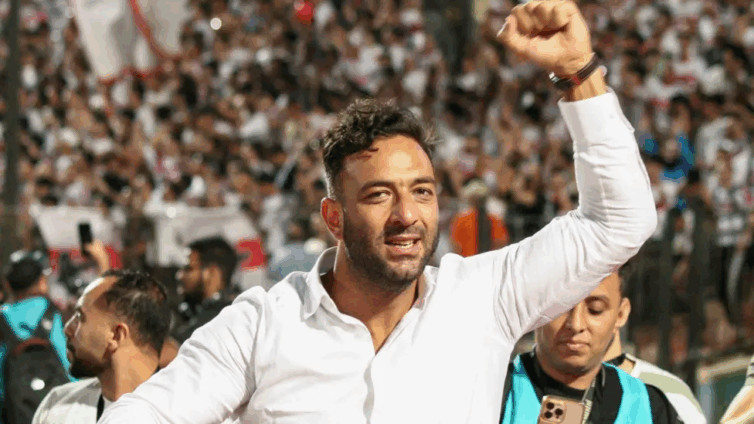From the Streets of Cairo to the Stands of Europe: Mido’s Audacious Plan to Rebrand Egyptian Football
Cairo, Egypt — On a patch of sun-baked grass tucked behind a row of crumbling apartment blocks, the next Mohamed Salah might be sharpening his first step-over. A hundred boys, shirts clinging to their backs in the August heat, move through cones and drills under the watch of Ahmed Hossam Hussein Abdelhamid—the man the football world once knew simply as Mido. Thirteen years ago he retired, still only 30, exhausted by his own talent. Today, at 42, he has returned not to reclaim the spotlight, but to manufacture it for others.
The Maker, Mido’s academy, does not look like much from the street: a modest gate, a painted crest, the faint thud of ball on boot. Yet its ambitions spill across borders and leagues. Mido wants Egypt—population 120 million, five-time reigning African club champion—to stop celebrating domestic supremacy and start exporting human capital at industrial scale. “Four or five Egyptians in Europe is an insult to our history,” he says, leaning against a goalpost, eyes scanning every pass. “In ten years I want 60, maybe 70. And then we keep going.”
The Prodigal Striker
To understand the scale of his wager, rewind two decades. Mido was the teenage firebrand who left Zamalek for Ajax, the brash centre-forward who scored a Champions League hat-trick before he could legally rent a car. He would wear the shirts of 11 clubs in seven countries—Tottenham, Roma, Middlesbrough, Marseille among them—collecting coaches’ reprimands as eagerly as goals. Confrontations with Ronald Koeman at Ajax, rows with Egypt managers Marco Tardelli and Hassan Shehata, a reputation for walking out when friction rose: the story wrote itself—dazzling talent, self-sabotaged.
Now Mido weaponises that history. “I am Exhibit A,” he tells the boys, flicking a stray ball back into play. “Big clubs, bigger regrets. I folded when I should have bent, quit when I should have asked how high. Learn the language, learn the culture, learn to bite your tongue when the coach yells. You do that, you stay.”
Curriculum Beyond the Pitch
Inside a low concrete building, a whiteboard lists modules that would puzzle most academies: *Cognitive Flexibility, Emotional Regulation, Cultural Fluency*. A staff psychologist meets every child weekly; English classes run nightly. The syllabus is Mido’s rebellion against the failure he sees in Egyptian football’s DNA—technical excellence paired with brittle adaptability.
“When I landed in Amsterdam I spoke zero Dutch, zero English,” he recalls. “I signed my first contract not knowing what it said. That can’t happen again.” One 15-year-old, Youssef, reels off Premier League fixtures in a London accent honed not in Essex but in a Cairo classroom. “We watch Match of the Day on Tuesdays,” he grins. “Then write reports.”
A Pipeline, Not a Dream Factory
Scouts from Belgium, Germany and France now visit The Maker unannounced. Last season four boys left for trials; two signed youth contracts in the Netherlands. Mido refuses to monetise transfers early—“I will not sell a 14-year-old for short-term cash”—but he is building a tracking network: former teammates now coaching in Europe who will house, mentor and monitor graduates. The idea is not to scatter talent but to shepherd it.
The academy currently funds itself through Mido’s punditry work and private donors. Girls’ teams launch next year; Mido’s daughter already trains with the under-12 boys. “If we ignore 50 percent of the population, the numbers will never add up,” he says.
The National Blind Spot
Despite Egypt’s continental dominance—Cairo clubs Al Ahly and Zamalek have claimed five of the last six African Champions League titles—only Mohamed Salah, Omar Marmoush, Trézéguet and a handful of others play in Europe’s top five leagues. By contrast, Senegal and Nigeria routinely export dozens. Mido calls it “a crisis hiding inside a trophy cabinet.”
The Egyptian Football Association has promised reforms—regional scouting centres, overseas scholarships—but Mido has stopped waiting. “They talk, I build,” he shrugs. “When the pipeline flows, they will have to listen.”
The Long Game
Evening prayer echoes from a distant minaret as practice winds down. Boys queue for protein shakes instead of fizzy drinks; a coach logs sprint times on an iPad. Mido gathers the group, voice low, almost conspiratorial. “Remember, the world only respects what it sees every weekend. You are not here to be the best in Cairo. You are here to be inevitable in Europe.”
He pauses, lets the words settle. Then he kicks a ball high into the purple sky and watches 100 pairs of boots chase it—toward stadiums they have only imagined, under floodlights they intend to make their own.
If Mido’s gamble pays off, the next decade of European football will feature a surge of Egyptians who speak like locals, think like veterans and play like believers. And somewhere in the stands—perhaps at Anfield, perhaps at the Bernabéu—the man who once squandered his own promise will watch, arms folded, a quiet smile playing on his lips.
The revolution, after all, begins with a single perfectly weighted pass.



No comments yet
Be the first to share your thoughts!